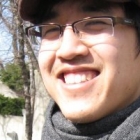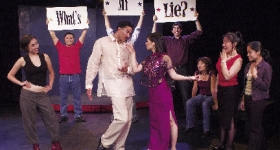A candlelight vigil held at Virginia Tech following the tragic 2007 shooting that claimed 33 lives. Photo credit: B.W. Townsend at Flickr
Virginia Tech was the
scene of a shooting tragedy last week, on Dec 7, when a campus policeman was slain and
his alleged killer apparently committed suicide. Details continue to dribble
out of Blacksburg as authorities try to piece together what took place.
The alleged
killer has been identified as
Ross Truett Ashley, 22, a Radford resident and part-time Radford University
student. The victim was Virginia Tech police officer Deriek Cruise. He was 39.
The campuswide alerts and
four-hour manhunt for Ashley evoked memories of the tragedy that took place in
Blacksburg four years ago, when Korean American Virginia Tech student Cho
Seung-Hui shot and killed 32 people before taking his own life.
Authorities are still
trying to figure out what motivated Ashley in this recent tragedy.
Matt Dailey, who told The Roanoke Times that he was Ashley's close friend and
classmate, said Ashley should not be compared to Cho.
Dailey said he had
accompanied Ashley two or three times to the same shooting range west of
Blacksburg once used by Cho, but said those visits were months ago."He didn't keep
[the gun] locked away, but all summer I don't think he had any bullets for the
gun," Dailey said. "He didn't buy bullets that often because bullets
are expensive.Observations about
Ashley's personality and behavior varied, but none suggested the sort of
psychopathology that afflicted Cho and raised numerous red flags before the
shootings on April 16.Dailey said he
"didn't see this coming.""I don't think
Ross is the kind of person to do this without some kind of reason," he
said. "But I'm not sure what that reason is because I didn't get to talk
to him."Dailey described
Ashley as withdrawn and noted he "was definitely off in some ways,"
but not necessarily more than other people.
The Associated Press
interviewed other residents of the building Ashley lived in.
Ashley lived in an
apartment on the top floor of a worn, gray three-story brick building in the
small city of Radford, a college town. He lived above a yogurt shop,
consignment store, barber shop and a tattoo parlor.On Friday night, students
popped in and out of the building visiting friends. Mandy Adams, a Radford grad
student, said Ashley had recently shaved his head. Other than running down the
hallways, he was quiet, she said.“He would just run down
the hallway -- never walk, always run,” said Adams, who was out on a rear fire
escape with a glass of white wine and a cigarette to calm her nerves. “It’s
going to be really creepy when they come to take his stuff out of here.”Neighbor Nan Forbes, a
Radford senior, said Ashley was rarely seen or heard from. She said she knew he
was in trouble when she saw two police officers guarding the door to his
apartment“It does freak us out because we live in this building, but there was
not one peep of trouble, nothing unusual,” she said.Ashley made the dean’s
list in 2008 at the University of Virginia-Wise, which is located in southwest
Virginia. He took classes at Radford, a former state teachers college in the
Blue Ridge Mountains that now has more than 9,000 students.
News media and observers
will make the inevitable comparisons between Cho and Ashley. Ashley's state of
mind and history are not known at this point, but it will be interesting to see
whether the topic of mental illness enters into the conversation.
We do know of the troubled
state of mind Cho was in before the 2007 incident. According to the US Department of Health and Human Services, suicide was the eighth leading cause of death for
Asian Americans and the ninth leading cause of death for white Americans in
2005. At the same time, the overall suicide rate for Asian Americans was half
that of white Americans.
Even so, Asian Americans
should still be cautious when it comes to mental health:
“He
(Cho) was referred to care and he went, but he never followed up,” says Nolan
Zane, Director of the Asian American Center on Disparities Research at the
University of California Davis, a government-funded initiative launched in the
months after the massacre at VA Tech. “This is not uncommon. Only about 28
percent of Asian Americans with mental illness seek help, because they are
ashamed, afraid, and also concerned about how, if people find out they have
mental illness, it would reflect on their family.”
Hyphen has tackled the sensitive issue of "model minority suicides" over the last year, including critiques of these types of psychopathology diagnoses.
On a more positive note, news reports indicate
that Virginia Tech's response in 2011 was far swifter and more effective than
four years ago.
Virginia Tech is still
answering questions as to how the university addressed the Cho Seung-Hui
shootings. The federal government has charged $55,000 in fines against
Virginia Tech for the university's initial lack of response in 2007.
In an extraordinary twist
of fate, the Dec 7 hearing finished an hour before the first alarms were set
off in Blacksburg. Virginia Tech officials used the Internet and social networking to
help warn the campus in a timely fashion, despite top security officials'
testifying 260 miles away in Washington, DC.
State and federal legislatures
may take another look at gun control laws after this latest tragedy.
In Jan. 2008, President George W. Bush signed into law changes to federal gun legislation aimed at strengthening record keeping and
collaboration among state and federal authorities. The legislation came in the
aftermath of the 2007 shooting and was focused on limiting mentally ill individuals' access to firearms.
So far, 14 states have taken advantage of the federal grants provided for improved record keeping; Virginia
opted in just this year.










Comments